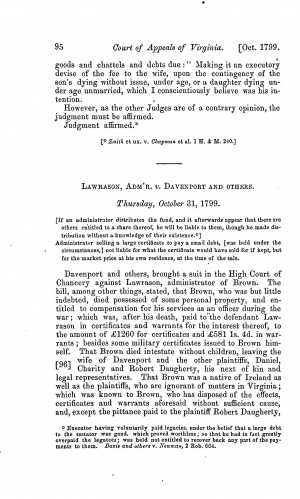Difference between revisions of "Lawrason v. Davenport"
(Created page with "{{DISPLAYTITLE:''Lawrason v. Davenport''}} File:WytheAmblerVWyld1852.jpg|link=Media:CallsReports1854V2LawrasonvDavenport.pdf |thumb|right|300px|First page of the opinion [[M...") |
m (→References) |
||
| (2 intermediate revisions by 2 users not shown) | |||
| Line 1: | Line 1: | ||
{{DISPLAYTITLE:''Lawrason v. Davenport''}} | {{DISPLAYTITLE:''Lawrason v. Davenport''}} | ||
| − | [[File: | + | [[File:CallLawrasonvDavenport1854v2p95.jpg|link={{filepath:CallsReports1854V2LawrasonvDavenport.pdf}}|thumb|right|300px|First page of the opinion [[Media:CallsReports1854V2LawrasonvDavenport.pdf |''Lawrason v. Davenport'']], in [https://catalog.swem.wm.edu/law/Record/2099031 ''Reports of Cases Argued and Adjudged in the Court of Appeals in Virginia''], by Daniel Call. 3rd ed. Ed. Lucian Minor. Richmond: A. Morris, 1854.]] |
__NOTOC__ | __NOTOC__ | ||
[[Media:CallsReports1854V2LawrasonvDavenport.pdf|''Lawrason v. Davenport'']], 6 Va. (2 Call) 95 (1799),<ref>Daniel Call, ''Reports of Cases Argued and Adjudged in the Court of Appeals in Virginia'', (Richmond: A. Morris, 1854), 2:95. George Wythe owned the [[Reports of Cases Argued and Adjudged in the Court of Appeals of Virginia|first edition]] of this set.</ref> was a case where the court determined whether an administrator is liable to unknown persons entitled to a share of an estate. | [[Media:CallsReports1854V2LawrasonvDavenport.pdf|''Lawrason v. Davenport'']], 6 Va. (2 Call) 95 (1799),<ref>Daniel Call, ''Reports of Cases Argued and Adjudged in the Court of Appeals in Virginia'', (Richmond: A. Morris, 1854), 2:95. George Wythe owned the [[Reports of Cases Argued and Adjudged in the Court of Appeals of Virginia|first edition]] of this set.</ref> was a case where the court determined whether an administrator is liable to unknown persons entitled to a share of an estate. | ||
==Background== | ==Background== | ||
| − | Lawrason had a wealthy estate and died without children or a will. Davenport and the other plaintiffs were Lawrason's next of kin. The plaintiffs sued Brown, the administrator of Lawrason's estate, for improper administration and general relief. Davenport argued that, as an Irish citizen, he was ignorant of | + | Lawrason had a wealthy estate and died without children or a will. Davenport and the other plaintiffs were Lawrason's next of kin. The plaintiffs sued Brown, the administrator of Lawrason's estate, for improper administration and general relief. Davenport argued that, as an Irish citizen, he was ignorant of Virginia law and taken advantage of. Further, Davenport argued that Lawrason’s estate not only held value from personal property, but was also entitled to about £1800 in military certificates and warrants for Lawrason’s service in the military. Davenport alleged that without an actual debt due, Brown sold the certificates and warrants in August 1791 and held the liquidated funds for himself. |
===The Court's Decision=== | ===The Court's Decision=== | ||
In September 1796, Chancellor Wythe decreed Brown pay the plaintiffs $1887.55; which would have been the present value of the certificates and warrants if they have been funded. Wythe also added $4,320.46 in interest. The Court of Appeals agreed that Brown should pay the plaintiffs, but believed the amount of the payment should be based on present day market value. The case was remanded to the High Court of Chancery for an account to be given to the effect of the decree. | In September 1796, Chancellor Wythe decreed Brown pay the plaintiffs $1887.55; which would have been the present value of the certificates and warrants if they have been funded. Wythe also added $4,320.46 in interest. The Court of Appeals agreed that Brown should pay the plaintiffs, but believed the amount of the payment should be based on present day market value. The case was remanded to the High Court of Chancery for an account to be given to the effect of the decree. | ||
| Line 16: | Line 16: | ||
__NOTOC__ | __NOTOC__ | ||
[[Category: Cases]] | [[Category: Cases]] | ||
| + | [[Category: Inheritance]] | ||
Revision as of 15:45, 12 December 2019

Lawrason v. Davenport, 6 Va. (2 Call) 95 (1799),[1] was a case where the court determined whether an administrator is liable to unknown persons entitled to a share of an estate.
Background
Lawrason had a wealthy estate and died without children or a will. Davenport and the other plaintiffs were Lawrason's next of kin. The plaintiffs sued Brown, the administrator of Lawrason's estate, for improper administration and general relief. Davenport argued that, as an Irish citizen, he was ignorant of Virginia law and taken advantage of. Further, Davenport argued that Lawrason’s estate not only held value from personal property, but was also entitled to about £1800 in military certificates and warrants for Lawrason’s service in the military. Davenport alleged that without an actual debt due, Brown sold the certificates and warrants in August 1791 and held the liquidated funds for himself.
The Court's Decision
In September 1796, Chancellor Wythe decreed Brown pay the plaintiffs $1887.55; which would have been the present value of the certificates and warrants if they have been funded. Wythe also added $4,320.46 in interest. The Court of Appeals agreed that Brown should pay the plaintiffs, but believed the amount of the payment should be based on present day market value. The case was remanded to the High Court of Chancery for an account to be given to the effect of the decree.
See also
References
- ↑ Daniel Call, Reports of Cases Argued and Adjudged in the Court of Appeals in Virginia, (Richmond: A. Morris, 1854), 2:95. George Wythe owned the first edition of this set.